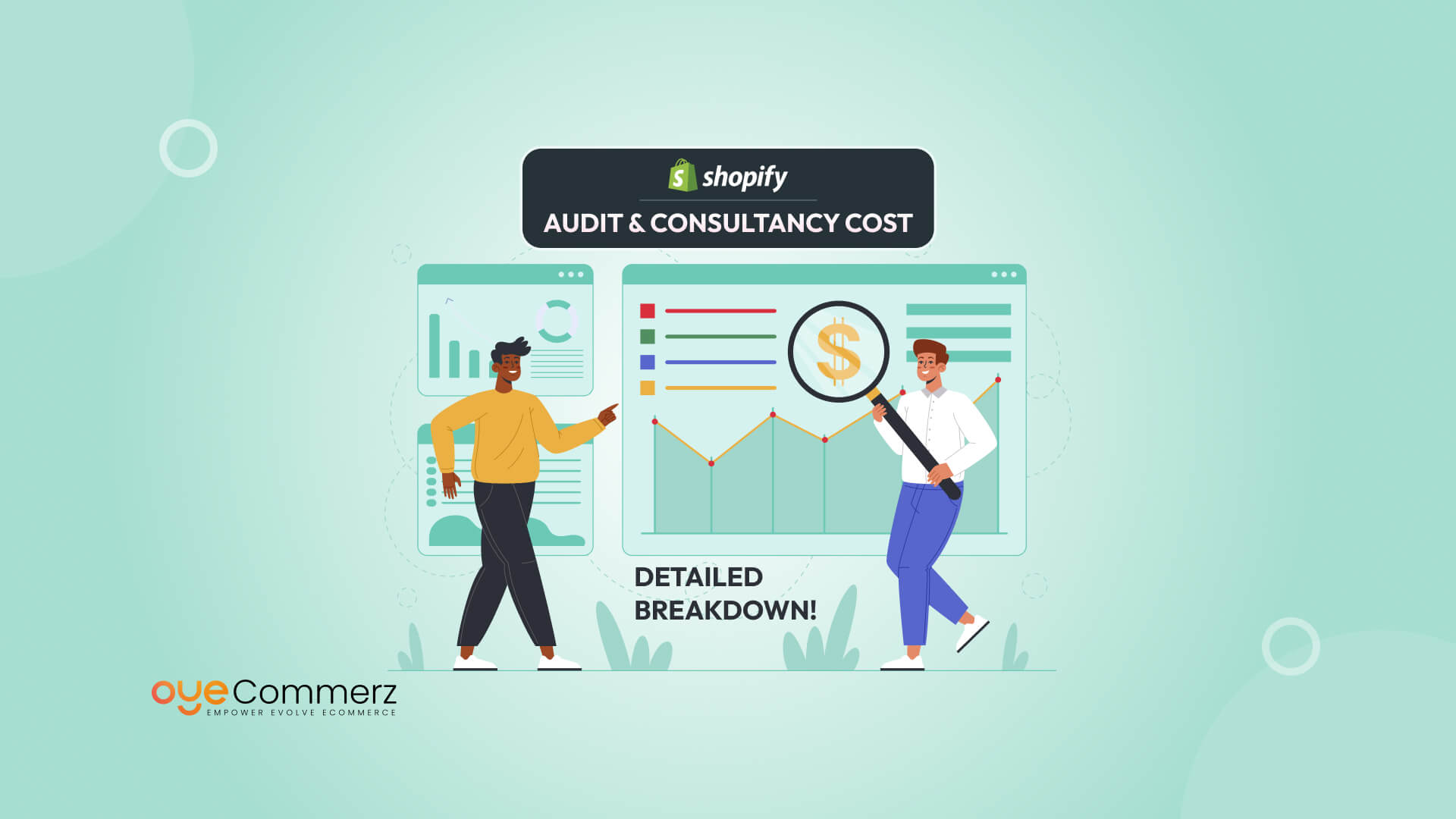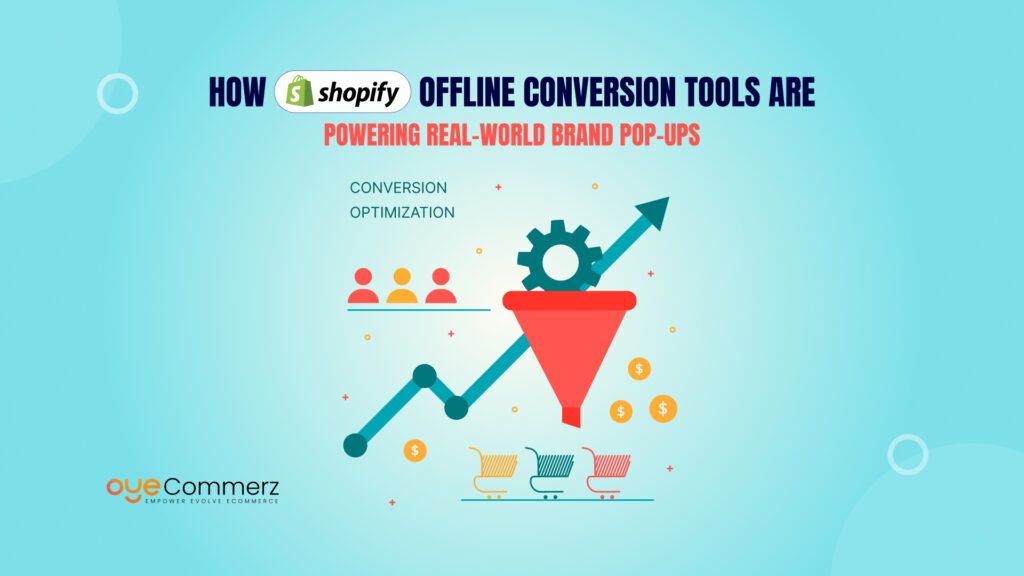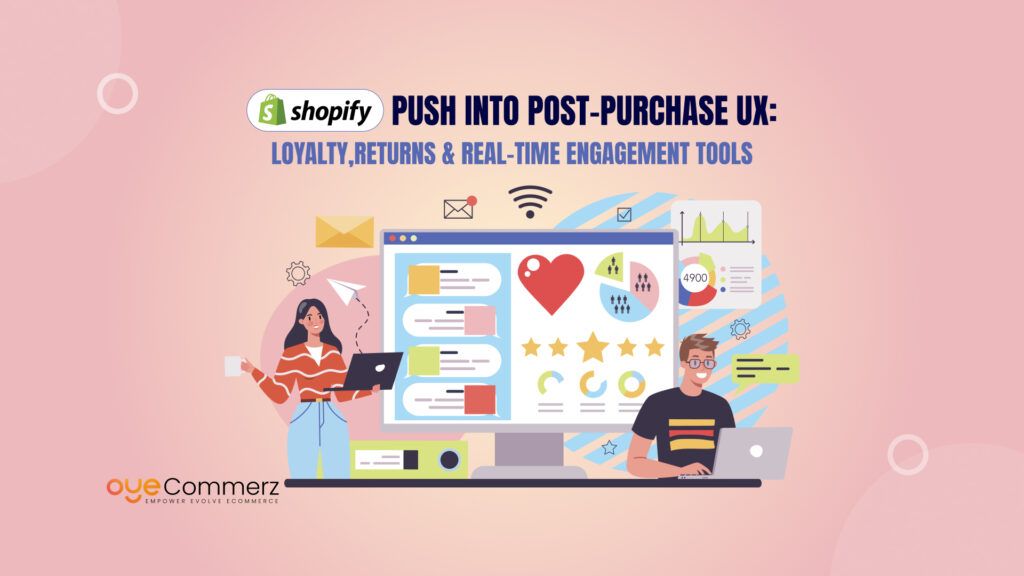Is your Shopify store not performing as expected, even after investing time and money into its setup? According to recent data, over 70% of Shopify store owners experience significant performance issues within the first year, often due to overlooked technical flaws, poor user experience, or unoptimized marketing strategies.
That’s where a Shopify audit and consultancy comes in offering a data-driven, expert-led review of your store to uncover hidden issues and identify new growth opportunities.
Whether you’re facing a sudden drop in traffic, struggling with low conversion rates, preparing to scale, or just completed a platform migration, a professional audit can be the key to unlocking better performance and higher revenue.
In this blog, we’ll break down exactly how much a Shopify audit and consultancy cost, what services are included, and the factors that influence pricing helping you make a well-informed investment in your eCommerce success.
Table of Contents
ToggleWhat is a Shopify Audit and Why is it Important?
A Shopify audit is a comprehensive review of your online store’s performance, design, functionality, and marketing readiness. It’s essentially a health check that identifies what’s working, what’s not, and where you’re leaving money on the table.
Shopify audits typically fall into several key categories:
- Technical Audit
Focuses on your store’s backend including theme code, site structure, page load speed, and mobile responsiveness to ensure everything is functioning smoothly and efficiently. - SEO Audit
Evaluates how well your store is optimized for search engines. This includes checking for missing metadata, broken links, poor keyword targeting, and overall crawlability. - UX/UI Audit
Assesses the design and user experience of your store from navigation to product pages to ensure a seamless shopping journey that encourages conversions. - Performance Audit
Reviews analytics and store metrics like bounce rate, time on site, and cart abandonment to pinpoint user behavior issues that might be costing you sales. - App & Integration Audit
Analyse the third-party apps and integrations you’re using. Are they slowing down your site? Are they still necessary or overlapping in function?
Each of these audits can be performed individually or as part of a full-store audit depending on your business needs and goals.
But it’s not just about finding flaws; a strategic consultancy session that follows the audit is where the real value lies. This is when an expert interprets the findings, provides actionable recommendations, and helps prioritize changes that will lead to measurable improvements in traffic, user engagement, and revenue.
What’s Included in a Shopify Audit?
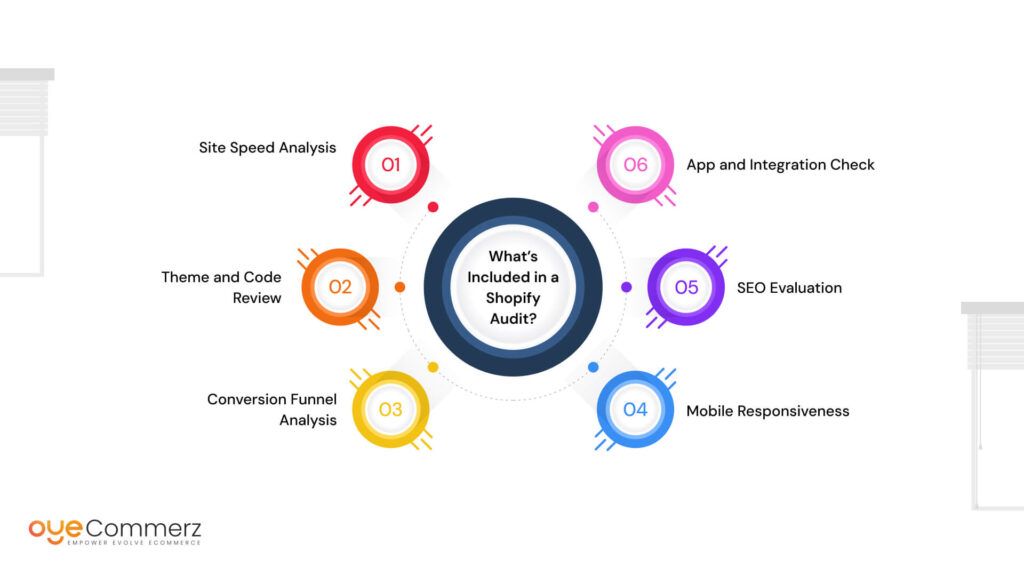
A Shopify audit covers multiple aspects of your store’s performance, design, and optimization. It helps identify weak spots that could be hurting conversions or limiting your store’s potential. Whether it’s a basic check or a deep-dive assessment, here are the key components typically included:
Site Speed Analysis
Speed is one of the most critical factors for user experience and SEO. This part of the audit evaluates:
- Load time across desktop and mobile
- Image compression and optimization
- JavaScript and CSS performance
- App-related slowdowns
Theme and Code Review
A bloated or outdated theme can create bugs and drag down performance. The audit reviews:
- Custom code and Liquid file quality
- Theme structure and organization
- Compatibility with Shopify updates
- Unused or redundant code
Conversion Funnel Analysis
This focuses on how users move through your site and where they drop off. Key areas assessed include:
- Homepage and navigation usability
- Product page design and CTAs
- Cart and checkout flow
- Trust-building elements (reviews, policies, guarantees)
Mobile Responsiveness
With the majority of Shopify traffic coming from mobile, this aspect ensures:
- Layout adapts properly across devices
- Clickable elements are usable on smaller screens
- Mobile checkout is smooth and fast
SEO Evaluation
Search engine visibility is essential for organic growth. This step checks:
- Page titles, meta descriptions, and heading structure
- Keyword usage and internal linking
- URL structure and indexing issues
- Technical SEO elements like schema markup
App and Integration Check
Apps can enhance functionality, but too many can create problems. This part examines:
- Which apps are active and how they impact speed
- Overlapping or redundant features
- App loading behavior (synchronous vs. asynchronous)
- Integration health with tools like email marketing, analytics, or CRMs
Basic vs. Advanced Shopify Audit: A Comparison
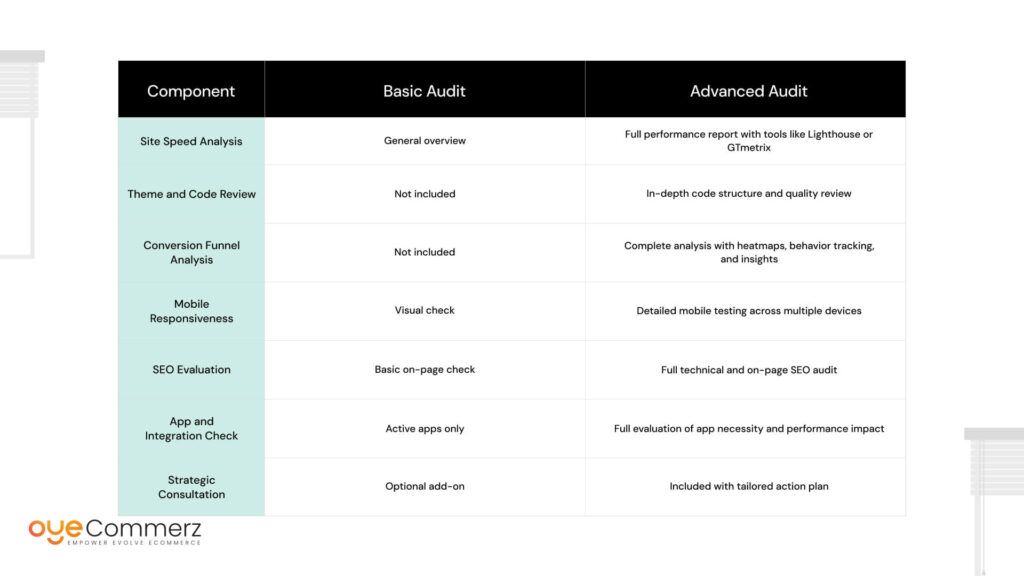
The level of audit you choose depends on your store’s stage and goals. If you’re just starting out or need a quick check, a basic audit may be enough. But if your store is underperforming or you’re preparing for growth, an advanced audit offers more insight and value.
What Does a Shopify Consultant Do?
A Shopify consultant is a seasoned expert who helps eCommerce businesses maximize the potential of their Shopify store. While a Shopify audit focuses on identifying issues, a consultant goes a step further by turning insights into action, guiding your strategy, resolving complex challenges, and helping you make data-driven decisions.
Here are the key roles a Shopify consultant typically plays:
Strategy Building
Consultants help you develop a growth roadmap tailored to your business goals. This includes:
- Target audience analysis
- Product positioning
- Store structure and navigation strategy
- Marketing and acquisition planning
Troubleshooting
If your store is facing specific issues such as slow loading, declining traffic, or checkout errors a consultant can:
- Identify the root causes
- Recommend solutions based on Shopify best practices
- Work with developers or apps to fix issues efficiently
Growth Planning
A good consultant doesn’t just fix problems, they help you scale. This can involve:
- Expansion into new markets or sales channels
- Planning for high-traffic seasons
- Increasing average order value (AOV) and customer lifetime value (CLTV)
- Optimizing customer retention strategies
Performance Monitoring
After implementing improvements, consultants help you measure results. This includes:
- Tracking KPIs like conversion rate, bounce rate, and page speed
- Setting up reporting dashboards
- Adjusting strategies based on performance data
One-Time vs. Ongoing Consultancy
One-time consultancy is ideal for businesses seeking help with a specific challenge like a redesign, migration, or performance drop. It usually includes:
- A discovery session
- A Shopify audit or review
- A detailed report with action items
Ongoing consultancy is best for businesses looking to scale or maintain consistent performance. It often includes:
- Monthly strategy calls or reports
- Ongoing performance monitoring
- Continuous optimization and testing
- Direct communication with a consultant or team
In short, a Shopify consultant acts as an extension of your team—providing clarity, expertise, and direction when it matters most.
Shopify Audit and Consultancy Cost Breakdown
Understanding how much to invest in a Shopify audit or consultancy depends on several variables starting with who you hire and how complex your store is. Below is a comprehensive breakdown of typical cost structures and what affects them.
Freelancers vs. Agencies vs. Shopify Experts
Each provider type brings different levels of experience, pricing, and service scope. Here’s how they compare:
Provider Type | Pros | Cons |
Freelancers | Cost-effective, flexible, direct communication | Varies in skill, limited capacity, may lack full-service support |
Agencies | Team-based approach, broader expertise, scalable support | Higher cost, may have less personal attention |
Shopify Experts | Shopify-vetted professionals with proven track records | Premium pricing, limited availability due to demand |
Cost Comparison
- Freelancers: $200 – $800 for one-time audits; $50 – $150/hour for consulting
- Agencies: $800 – $2,000+ for audits; $100 – $300/hour or retainer-based
- Shopify Experts: $1,000 – $3,000+ for comprehensive audits and strategic consulting
Price Ranges (Based on Scope and Provider Type)
The scope of the service plays a major role in pricing. Here’s what you can expect to pay on average:
Service Type | Typical Price Range | Description |
Basic Audit | $200 – $500 | Includes surface-level checks (speed, responsiveness, SEO) |
Full-Site Technical Audit | $800 – $1,500 | Comprehensive code, UX, SEO, and app review |
One-Time Consultation | $300 – $800 | Strategy session + summary of recommendations |
Ongoing Consultancy | $100 – $300 per hour | Hands-on, continuous improvement support |
Monthly Retainers | $500 – $2,000+ | Best for growing brands that need regular expert involvement |
Note: Prices can vary significantly based on provider location, experience level, and the industry you operate in.
Cost Influencing Factors
The following variables can significantly impact the cost of your audit or consultancy engagement:
- Store Size and Complexity
Larger catalogs, custom product types, or international storefronts require more time and deeper analysis. - Customization Level
Heavily customized themes or bespoke functionalities (e.g., custom apps) often demand more technical auditing. - Number of Apps and Integrations
A store using many third-party apps or external tools (email marketing, CRMs, analytics) will require more scrutiny. - Audit Depth
Basic audits are quicker and more affordable. In contrast, deep-dive audits include behavioral analysis, technical SEO, and full UX reviews. - Agency Reputation or Consultant Experience
Established consultants or top-rated agencies typically charge more, but they also bring proven processes and faster results.
Is a Shopify Audit Worth the Investment?
If you’re running a Shopify store, you’ve likely invested time, effort, and budget into its setup. But when performance stalls or revenue plateaus, it’s easy to wonder: Is paying for a Shopify audit or consultant really worth it?
The short answer? Yes when done correctly, the return on investment can be substantial.
Real-World ROI Examples
Here are a few scenarios that highlight how audits can directly impact business performance:
- Improved Site Speed
A store owner invested $900 in a full technical audit. One of the main recommendations was optimizing images, removing unused apps, and reducing render-blocking scripts.
Result: Page load time improved by 2 seconds, which led to a 15% increase in conversion rate within the first month. - Conversion Funnel Fixes
After a conversion audit revealed that over 40% of users dropped off at the product page, changes were made to CTA placement, product descriptions, and trust signals.
Result: The client saw a 22% increase in add-to-cart actions and a 12% improvement in sales with no additional ad spend. - SEO Optimization
A fashion retailer received an SEO audit for $700 that highlighted duplicate meta tags and poor keyword targeting. After implementing the fixes:
Result: Organic traffic grew by 30% in 90 days, reducing reliance on paid ads.
Cost vs. Benefits Discussion
While an audit or consultancy engagement can cost anywhere from a few hundred to several thousand dollars, the benefits often outweigh the initial investment especially for growing or scaling brands.
Benefits to Consider:
- Higher conversion rates and average order value
- Increased organic traffic from SEO improvements
- Better user experience, leading to lower bounce rates
- Faster site performance, especially on mobile
- Fewer abandoned carts through optimized funnels
- Strategic clarity that avoids wasted effort and resources
In many cases, a single optimization discovered during an audit can pay for the service itself especially if it results in increased revenue or a reduced ad budget.
How to Choose the Right Shopify Audit Partner
Not all Shopify consultants or audit providers are created equal. Choosing the right partner can be the difference between a generic checklist and a transformation that drives real revenue. Here’s how to ensure you’re making the right choice.
Key Criteria to Consider
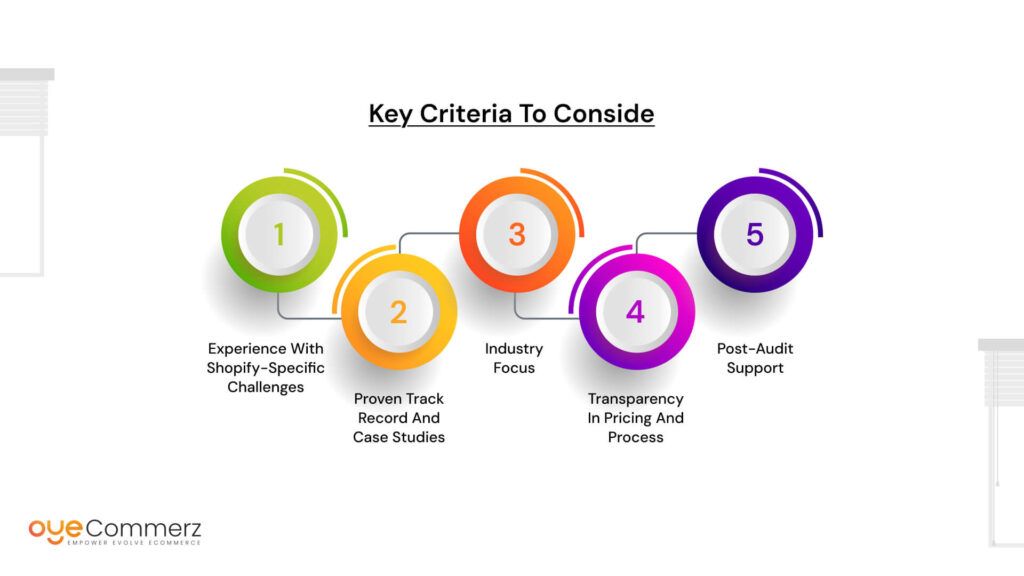
- Experience with Shopify-Specific Challenges
Your provider should have hands on experience working within the Shopify ecosystem, not just general eCommerce platforms. Look for:
- Familiarity with Liquid code, Shopify’s theme engine
- Knowledge of Shopify-specific SEO and performance nuances
- Insight into the app ecosystem and integration challenges
- Proven Track Record and Case Studies
Check for real client stories and measurable results. A reliable partner should be able to show:
- Before-and-after performance comparisons
- Specific metrics improved (e.g., site speed, conversions)
- Testimonials from Shopify merchants
- Industry Focus
If possible, look for a provider who understands your niche. The challenges of a fashion brand differ from those of a B2B wholesaler. Industry experience helps with:
- Tailored recommendations
- Relevant competitor analysis
- Better understanding of customer behavior
- Transparency in Pricing and Process
A good consultant or agency will walk you through:
- What’s included (and what isn’t)
- Expected timelines
- Deliverables such as reports, recommendations, and consultations
- Post-Audit Support
The audit itself is just step one. Ask if the provider offers:
- Help implementing fixes
- Ongoing monitoring or retesting
- Strategic follow-up sessions
Questions to Ask Before Hiring
To avoid surprises and make an informed decision, here are questions worth asking any potential audit partner:
- How many Shopify stores have you audited?
- Can you share case studies or references?
- What does your audit process look like from start to finish?
- Do you provide implementation support after the audit?
- Will I receive a prioritized action plan or report?
- How do you track and measure the success of your recommendations?
- Do you offer ongoing consulting or just one-time audits?
- What is your communication and reporting structure like?
Tips to Get the Best Value for Your Budget
A Shopify audit or consultancy can deliver powerful results but only if it’s done strategically. Here’s how to maximize every dollar you spend and ensure you’re not just getting an evaluation, but a roadmap for real growth.
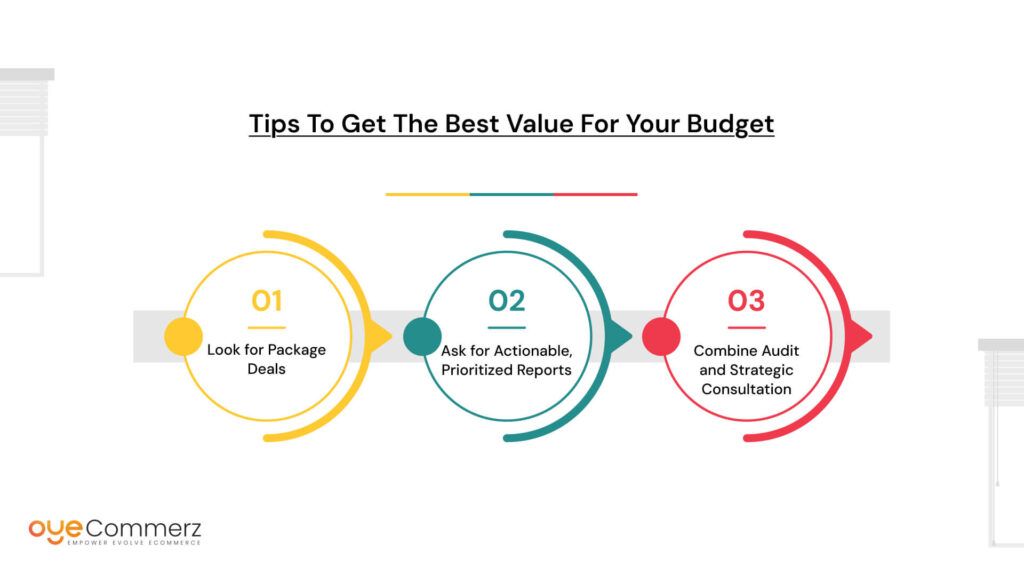
1. Look for Package Deals
Many consultants or agencies offer bundled services that can save you money while delivering more comprehensive support. Instead of purchasing a standalone audit, ask if they provide:
- Audit + implementation packages
- Audit + consulting hours
- Monthly retainer options with performance reviews
Package deals often come at a discount compared to booking services separately and help ensure consistency in execution.
2. Ask for Actionable, Prioritized Reports
Avoid generic reports filled with surface-level observations. You want:
- Clear, prioritized action items (what to fix first)
- Insights backed by data (e.g., how much speed is costing you)
- Strategic recommendations, not just technical jargon
Tip: A great audit doesn’t just tell you what’s wrong it tells you what to do next.
3. Combine Audit and Strategic Consultation
An audit without a follow-up consultation is like a diagnosis without a treatment plan. If you’re investing in an audit, pair it with at least one strategic session to:
- Review findings in plain language
- Discuss your business goals in context
- Get tailored guidance on implementation
This combination ensures the audit becomes a stepping stone for growth rather than a static document that sits in your inbox.
Bonus: Be Clear About Your Goals Upfront
Whether your focus is speed, conversions, SEO, or post-migration clean-up, let your audit partner know from the start. This allows them to:
- Tailor the audit to your priorities
- Deliver insights that directly align with your business needs
- Avoid wasting time on irrelevant details
When Should You Invest in an Audit or Consultancy?
Knowing when to invest in a Shopify audit or consultancy can make all the difference in achieving long-term success. Whether you’re facing issues or looking to scale, here are key signs that your store could benefit from expert attention, and the best times to schedule an audit or consultancy.
Signs Your Store Needs an Audit
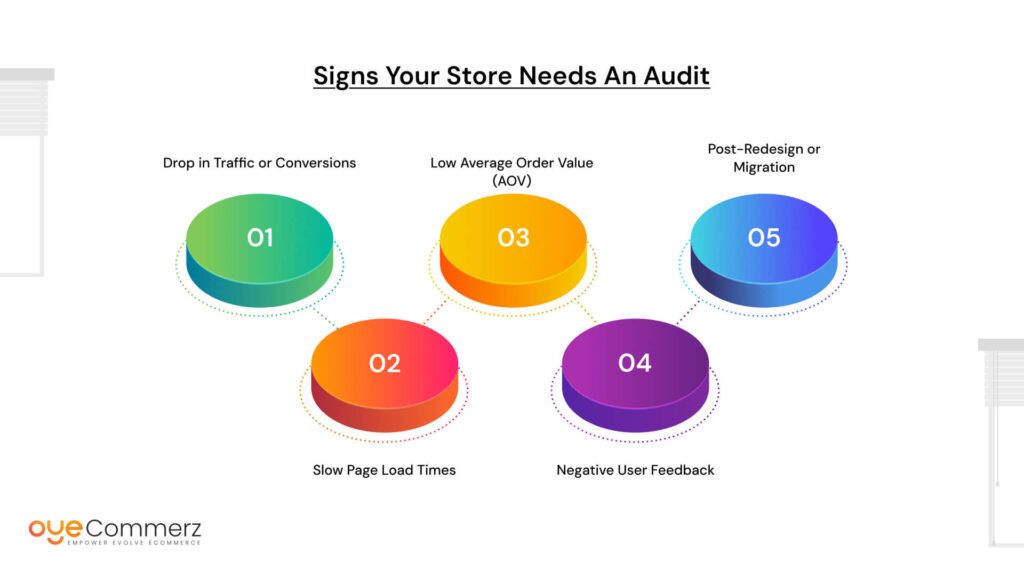
- Drop in Traffic or Conversions
If you’ve noticed a sudden or gradual decline in site traffic, conversion rates, or both, an audit can help identify the root cause whether it’s poor SEO, slow loading times, or a broken checkout process. - Slow Page Load Times
If your site takes more than 3 seconds to load, you may be losing valuable customers before they even reach your product pages. A speed-focused audit can pinpoint the bottlenecks. - Low Average Order Value (AOV)
A strategic audit can reveal issues with your sales funnel, product presentation, or upselling techniques, all of which can be addressed to increase AOV and overall revenue. - Negative User Feedback
Customer complaints about usability, confusing navigation, or a difficult checkout process are red flags. A UX/UI audit can help resolve these pain points and improve the overall experience. - Post-Redesign or Migration
If you’ve recently redesigned your site or migrated from another platform (like WooCommerce or Magento), an audit ensures everything is working properly and no key elements have been overlooked. Post-migration audits also verify that data like URLs redirects, and SEO settings are transferred correctly.
Best Timing for an Audit or Consultancy
- Before Peak Sales Seasons
If you anticipate a busy shopping season (e.g., Black Friday, Christmas, or back-to-school), it’s crucial to conduct an audit well ahead of time to ensure your site is optimized for high traffic, fast loading, and smooth transactions. You’ll want to fix issues early to avoid customer frustration during peak times. - After a Website Redesign
Redesigning your store can lead to unexpected issues. Even small design changes can affect functionality, SEO, and performance. A post-redesign audit will help ensure everything works as intended and that the changes positively impact user experience and sales. - After Migration
Migrating to Shopify from another platform (or even upgrading your current Shopify store) should be followed by an audit to verify that all aspects, from SEO settings to integrations, have been successfully transferred without breaking anything on the site. - After Significant App Installations or Updates
Installing new apps or updating existing ones can sometimes cause unexpected performance issues or conflicts. A quick audit can help assess the impact of these changes and ensure your store runs smoothly.
When to Schedule Ongoing Consultancy
While audits are typically one-time engagements, ongoing consultancy can help you scale and optimize your store as it grows. You might consider investing in ongoing consulting if:
- Your store is rapidly growing and needs regular performance checks.
- You’re expanding into new markets or sales channels.
- You’re experimenting with A/B testing, marketing strategies, or new product lines.
Need Help With Your Shopify Store?
If you’re ready to optimize your Shopify store and take it to the next level, we’re here to help! Book a free audit consultation or discovery call today to discuss your store’s performance and uncover actionable insights.
Get Started with Oyecommerz and let us help you achieve your eCommerce goals!
Let's build your custom Shopify app today!
Conclusion
Investing in a Shopify audit or consultancy is a smart move for your eCommerce business. It helps identify hidden issues, provides actionable insights, and offers strategic guidance to improve site performance, increase conversions, and boost traffic. The improvements you make from an audit can lead to long-term ROI, paying for themselves by enhancing user experience and driving more sales.
If you haven’t assessed your store’s performance recently, now is the time to do so. Whether you’re facing technical issues or want to optimize growth, an audit or consultancy can help you stay ahead and ensure your store is performing at its best.
Frequently Asked Questions
The cost of hiring a Shopify agency typically ranges from $3,000 to $30,000+ depending on the scope of the project. Basic store setups might fall on the lower end, while custom design, development, and growth-focused services (like CRO and SEO) push costs higher. Monthly retainers for ongoing support and marketing can range from $1,000 to $5,000+.
Shopify Experts usually charge based on their specialization and experience.
One-time tasks (like theme tweaks or small fixes): $50–$500
Custom development or design: $500–$5,000+
Hourly rate: $75–$200/hour
Expect to pay more for highly rated experts or urgent timelines.
A full Shopify store setup typically costs between $500 and $5,000. This depends on the complexity of your store, number of products, required features, and whether you’re using a custom or premium theme. Some freelancers may offer setup packages under $1,000, while agencies charge more for strategic setup and optimization.
eCommerce consultants usually charge:
Hourly rates: $100–$300/hour
Monthly retainers: $1,000–$5,000+ for ongoing support and strategy
Project-based pricing: Ranges based on scope (e.g., $2,000–$10,000 for a full audit and growth plan)
Rates vary depending on the consultant’s expertise, niche focus (like Shopify or fashion), and the complexity of your business needs.

